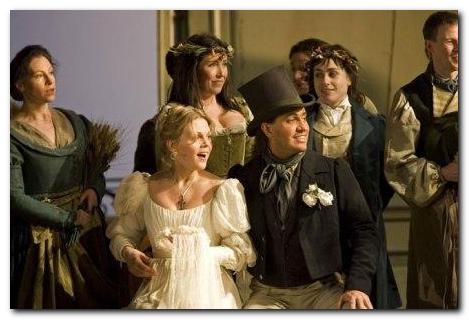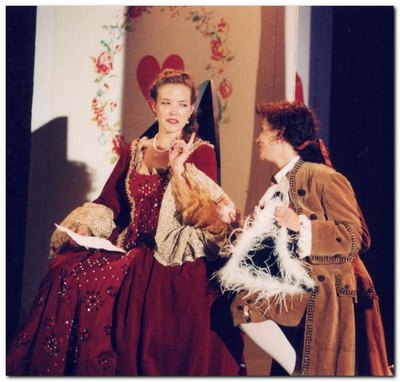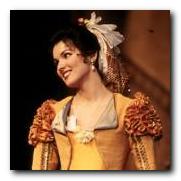One of the strange things I’ve never quite understood is our love for musicals. Yep I’m referring to the popular and widely-performed musicals by current composers like Claude-Michel Schönberg and Andrew Lloyd Webber, of which Les Misérables and The Phantom of the Opera are their most famous ones respectively. Whenever either musical is in town, there will be Singaporeans tripping themselves in a mad rush to get tickets. Everyone around me would be asking “Have you seen Les Miz???”
Truth to tell, I’ve never been fascinated with either musical. And yes, I’ve watched and heard them both. I’m certainly biased when I write and say this: that while bits of both musicals are sorta nice, in a musical sense, I’ve never found the pieces in either work terrifically sophisticated. In fact, and at the risk of offending the legions of fans of these two musicals, I’ll go so far to say that the music in these two works are “nothing special”.
Now don’t get me wrong here. The songs are catchy, and even Ling on occasion has hummed and sung bits of Les Miz at home. But the strength in those songs lie primarily in the words. The music itself for me does nothing to reflect the personality, the dynamic nor the circumstances of the scene at hand… which is exactly what music is supposed to do. The best music is subtle, and none of the in-your-face hollering from certain numbers in Les Miz. The best music also goes beyond stirring emotions. It should by itself be able to tell the story. It’s sort of like what John Williams did for the original Star Wars trilogy. Those movies can be watched without dialog and with music only to tell their stories.

Le Nozze di Figaro was the first live performance opera I watched. This was in 1986, and before I eventually suffer from further memory loss in a few more years, I’d better write the name of the group that performed it here live in Singapore! It was the London Touring Opera and they did a two night performance at the old Singapore Labour Foundation auditorium along Thomson Road. I also remembered nudging both my best friend then who introduced me into the world of classical music (he eventually did his Ph.D studying crabs), and my music teacher to attend the performance.
OK, so what is the story about Figaro about? The short version: it’s a comedic opera about marriage and infidelity in which nobody dies and there’s a happy ending. There you have it.:)
 Longer version: Count Almaviva is a philandering sort of nobleman, who while married to the Countess, still flirts with the wife, Susanna, of his valet, Figaro. As the story goes, Figaro, Susanna and the Countess all conspire to expose the Count’s indiscretions and embarrass him. The heroes of the story are Figaro, a witty manservant who can think well above his station, and his cheery wife Susanna who has a mean stick of a hand; she slaps men in the story, all of whom deserve it!
Longer version: Count Almaviva is a philandering sort of nobleman, who while married to the Countess, still flirts with the wife, Susanna, of his valet, Figaro. As the story goes, Figaro, Susanna and the Countess all conspire to expose the Count’s indiscretions and embarrass him. The heroes of the story are Figaro, a witty manservant who can think well above his station, and his cheery wife Susanna who has a mean stick of a hand; she slaps men in the story, all of whom deserve it!
Now, the London Touring Opera was a small troupe, and that night engaged locals to supplement its production of Figaro here. The five lead roles were all from the troupe, but specific roles were by Singaporeans, e.g. Antonio the Gardener. And would you believe it; the chorus was an amateur choir from Braddell.:) The opera was not performed in the original language from Lorenzo da Ponte’s libretto but in English, and the music a piano adaptation from Mozart’s original orchestral score.
But I absolutely loved the performance! The opera is Mozart’s best, even considering the piano adaptation. Each musical note isn’t merely there for accompaniment, but instead add further color and texture to the words that are sung.
There were many things in that night that’s etched in memory. The pianist who provided the accompaniment while at the same time conducting from whichever hand that happened to be free whenever. The towering and imposing fellow who sang the role of the Count, the singer who played the long-suffering and lonely Countess, the petite and very cute singer who played brave Susanna, and the slightly rotund and jolly person who played Figaro. And every person in the cast was clearly enjoying themselves throughout their performance.
 But it was the Susanna whom the audience fell in love with that night. After the nearly three and a half hour performance including intermission time, the cast returned for the recognition and applause. And the singer who performed the role of Susanna received the loudest applause and standing ovations. I remembered she alone had three curtain calls!
But it was the Susanna whom the audience fell in love with that night. After the nearly three and a half hour performance including intermission time, the cast returned for the recognition and applause. And the singer who performed the role of Susanna received the loudest applause and standing ovations. I remembered she alone had three curtain calls!
Since that night’s performance, I’ve returned to watch and listen Figaro countless times over the years but always in the original langugage, Italian. But with my recent subscription to eMusic, I finally picked up the sung-English version of the opera several nights ago. I’ve now returned to that much-cherished memory… Of a small modest band of singers who brought me to their fascinating world of Classical Opera.:)
(All pictures here in this entry from various productions of Figaro)
Recent comments